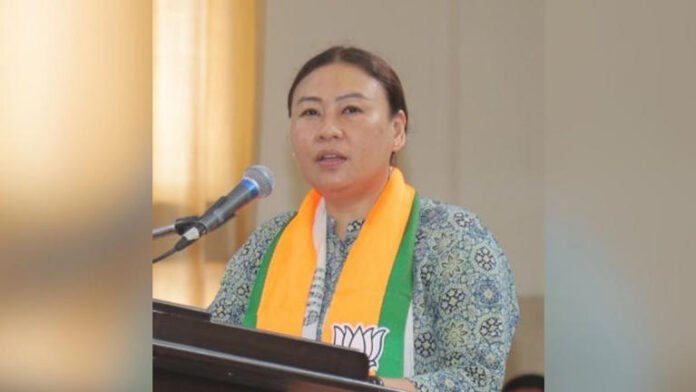Nagaland Rajya Sabha MP S. Phangnon Konyak has been appointed as a member of the Court of North-Eastern Hill University (NEHU), Meghalaya. Her inclusion in the university’s apex decision-making body highlights not only her rising stature in Indian politics but also the Centre’s emphasis on reinforcing regional voices in key academic institutions.
The nomination was officially confirmed through a notification from the Rajya Sabha Secretariat and is effective from April 15, 2025. The appointment has been made by the Vice President of India, who also serves as the Chairman of the Rajya Sabha.
From Parliament to University: A Multifaceted Leader
S. Phangnon Konyak holds the distinction of being the first woman from Nagaland to be elected to the Rajya Sabha, and only the second woman ever from the state to enter either House of Parliament. Known for her articulate and grounded presence in the Upper House, Konyak has championed a range of issues related to gender equality, regional development, and indigenous rights.
Her inclusion in NEHU’s Court reflects her growing involvement in shaping not just political narratives but also educational and social frameworks within the Northeast.
What the NEHU Court Represents
The Court of NEHU is the highest statutory body of the university and plays a pivotal role in directing the institution’s long-term policies, reviewing annual reports, and guiding its academic, administrative, and financial priorities. It includes representatives from academia, government, and public life to ensure a balanced and holistic approach to educational governance.
By inducting a leader like Phangnon Konyak, the Court gains a voice that represents both grassroots realities and national-level perspectives—particularly significant for a university that serves a region as diverse as the Northeast.
Education in the Heart of the Hills
Founded in 1973, NEHU is a premier central university with campuses in Shillong and Tura, Meghalaya. It caters to students from across the Northeast and plays a central role in higher education for states like Mizoram, Nagaland, and Arunachal Pradesh. Over the decades, NEHU has been a hub for cultural exchange, academic growth, and social mobility.
Konyak’s association with NEHU comes at a critical time when universities across the country are being encouraged to foster inclusivity, research-oriented curricula, and regional empowerment through education. Her experience as a lawmaker and a social advocate is expected to bring valuable insights into policymaking and university reforms.
A Role Model for Northeast Women
Beyond her political achievements, Phangnon Konyak stands as a symbol of empowerment for women in the Northeast, especially in Nagaland, where women’s political participation has historically been limited. Her steady rise from grassroots activism to Parliament, and now to academic governance, sends a powerful message to young women across the region.
With this appointment, she is expected to advocate for better student support systems, increased scholarships for underprivileged communities, and initiatives to bridge the gap between university education and local employment opportunities.
Addressing the Region’s Educational Needs
The Northeast continues to grapple with challenges such as access to quality education, infrastructural gaps, and limited academic exposure to global trends. Leaders like Konyak can help address these issues by ensuring that policymaking at the university level remains grounded in regional realities.
Her presence on the NEHU Court may also encourage more coordination between universities and the Parliament, opening doors for government-backed research, innovation grants, and community-based learning projects.
Phangnon Konyak’s appointment to the Court of North-Eastern Hill University is more than just a ceremonial inclusion—it is a strategic step towards building stronger bridges between governance and education. As someone who represents both a tribal heritage and a progressive political outlook, her role is expected to catalyze positive change in the university’s development and contribute to a broader vision for educational excellence in the Northeast.
As she takes on this new responsibility, the region—and especially its youth—will be watching with hope, expecting meaningful contributions from one of its most inspiring leaders.




